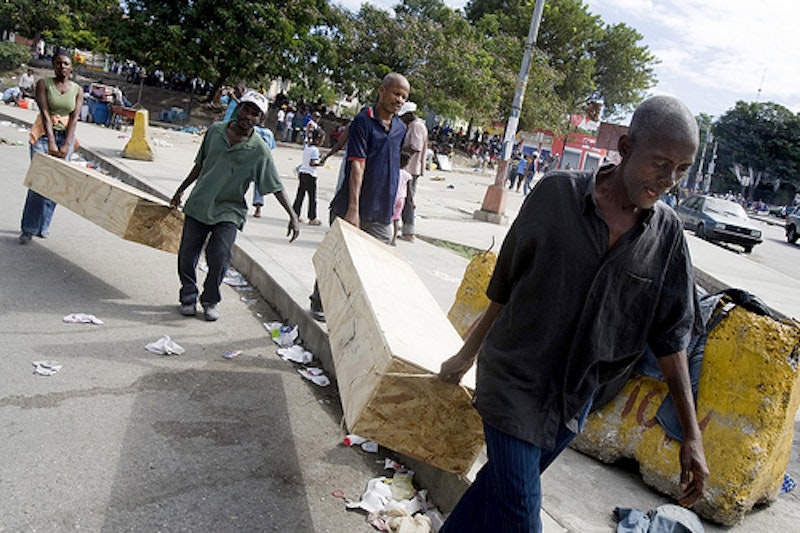People are starving in Haiti, fighting in Africa, and thirsty in Asia. I’m responsible for this—right? After all, the state tells us to love the world. Realizing that I am not doing a particularly good job preventing world suffering, I feel guilty. Guilt requires atonement. Atonement requires a sacrifice.
Humans are capable of loving our families, our neighbors, and ourselves but we cannot love an abstract idea. Love at first sight leads to an overwhelming desire to know the beloved person better. In other words, true love can only love people it knows. As Aquinas told us eight centuries ago, you can’t have love without some knowledge of what exactly it is that you’re loving.
Love is a personal thing. I can love you, but I cannot love humankind—an abstract mass that doesn’t have a face, a home, or even a name. By accepting the responsibility to love the world, I inevitably incur guilt because I’ve made myself responsible for the impossible. It was God who loved the world. I realize that I cannot—there is only one of me, and there are six and half billion of them. Even Facebook won’t let me have that many friends.
But even though I realize the futility of this cosmo-philic quest, I still feel guilty. I’ve tried to do the impossible and become individually responsible for the lack of food in Haiti, the wars in Africa and the water shortages in Asia. It doesn’t work. And thus, I feel guilty—guilty for failing to do something I couldn’t possibly do anyway, but guilty nonetheless. I have two options for dealing with this guilt: atone for it myself, or place it—and thus the atonement it requires—on somebody else.
Unresolved guilt can only make the world a hellish place. That’s because guilt demands justice; but that justice has metamorphosed into a vague sense of “social justice,” impossible to achieve because no one knows what it is. It seems to have some relationship to assuming responsibility for the entire world, though—so in other words, the only way to get justice is to assume more guilt onto yourself. There’s something a little screwy in this sort of system, don’t you think? Let’s take a closer look.
By beginning with the premise that we are responsible for the suffering in the world, we come to the ultimate conclusion that we must delegate our responsibility to an elite few who will take care of it for us. Responsibility for the whole world is more than we can bear; therefore, this appears to be the only way in which our problem can be resolved.
Like authority, however, responsibility is only dislocated, not destroyed. We cannot completely eradicate this responsibility; we must give it to someone else. But on the other hand, most people are struggling with their own responsibilities, and less than willing to take ours.
Nevertheless, in every society, there are some who are quite willing to take our responsibility, so long as we give them money and power. Naturally, these people consistently end up in government: they get money and power, and have only to assume other people’s responsibilities. It seems like a neat solution to the problem. But what actually happens is that, in giving up our alleged responsibility for the world, we lose our feeling of responsibility for those closest to us. We cease to assume any responsibility, and endow the state with powers previously reserved to the individual.
Consider this. You lose your job, the bank forecloses on your home, and you find yourself living in a cardboard box under a bridge. You still have your iPod, but a rodent irreparably damaged your earbuds. One morning I’m out jogging and I stop to talk to you for a while. You tell me about the damaged earbuds and how the one valuable thing you had left had become useless to you. On impulse, the thought enters my mind, “Should I give you my Bose headphones?” Just as impulsively, the wayward thought leaves again. Why on earth would I give you my stuff when it’s the government’s job to give you stuff? Besides, the government can give you more stuff than I can, they know who you are, they have plenty of money—a hundred, or a hundred million, rationalizations for my callous selfishness float through my mind. Shoot, the government can even pass a law to put bad-tasting chemicals in earbud wires, so that too-friendly rodents don’t eat them anymore. The more I think about it, though, the better I feel about myself and my newfound lack of charity.
But the love-the-world ethos lets me go from feeling guilty about thirsty Asians to feeling self-righteous about my Bose earphones. And it seems to me that there’s something really wrong with that. Before, our lack of action made us guilty. Now it makes us righteous. Do you see a problem here? Yeah, me too. Now we love the world, but ignore our neighbor. This is the consequence of accepting a false sense of responsibility.
Love your neighbor. Let God love the world.

